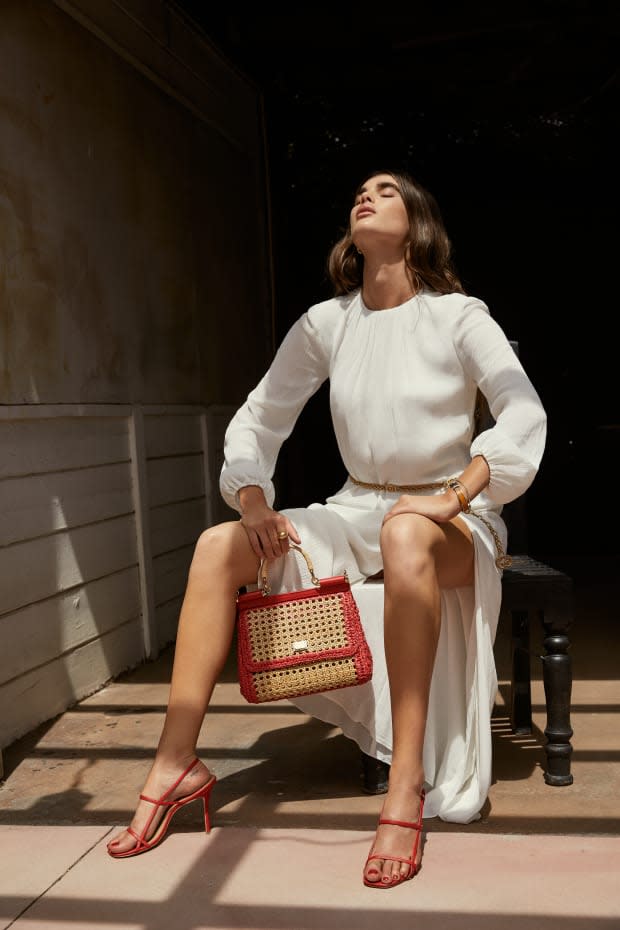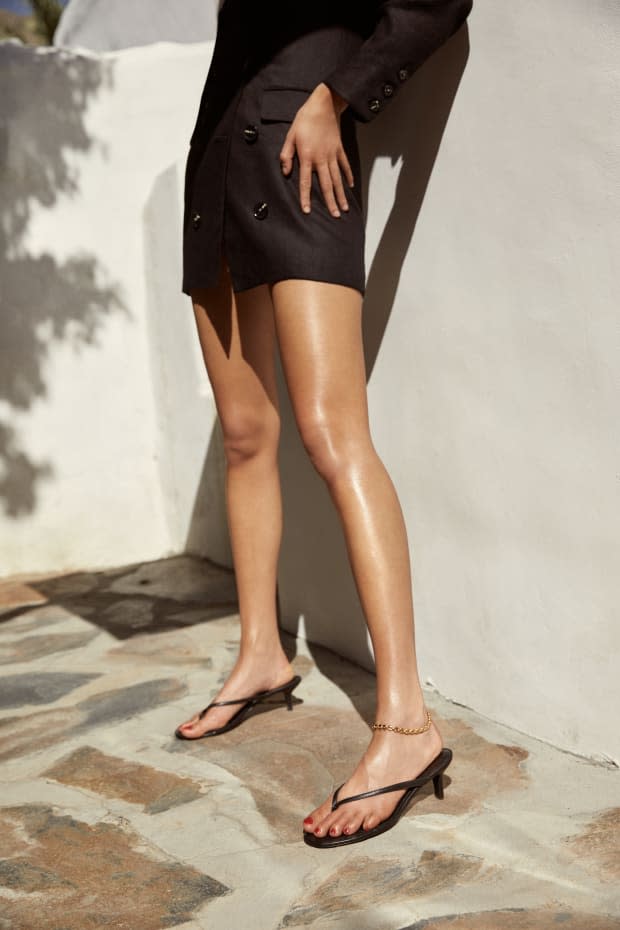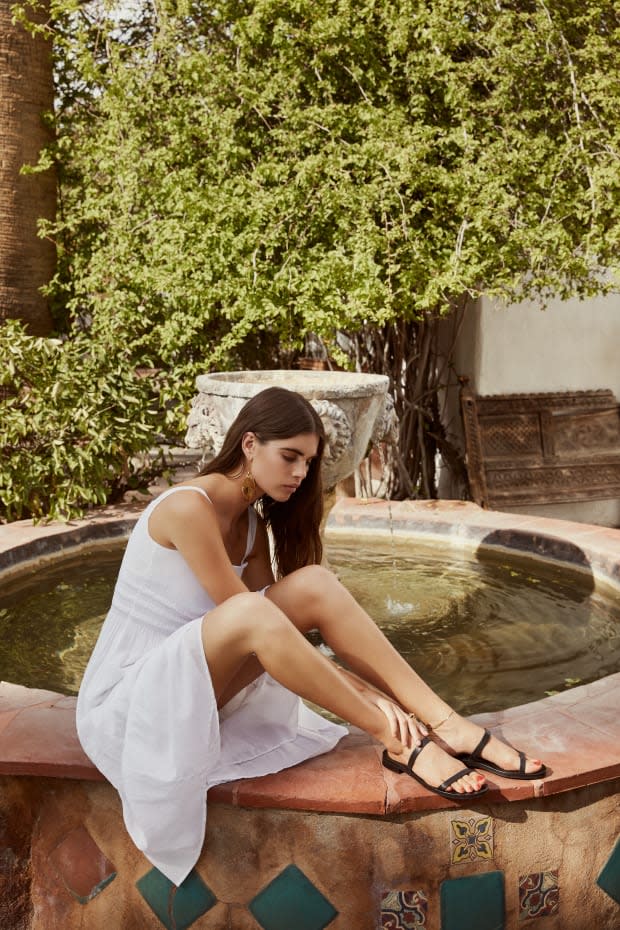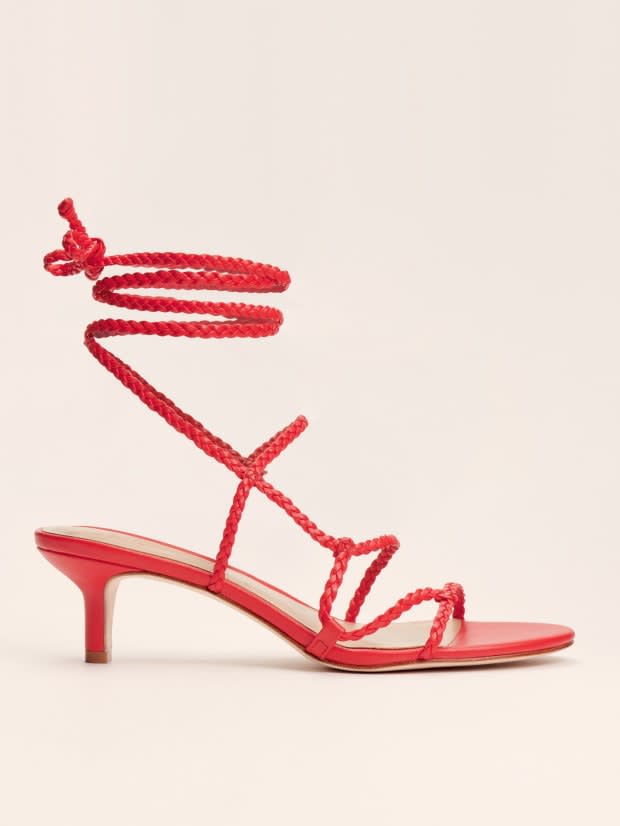Reformation Launched a Line of Sustainable (and Sexy) Shoes
They aim to do for footwear what Reformation clothing did for womenswear: make sustainability sexy.

Reformation, that of the form-fitting floral dresses and sustainable production methods, "wants to touch your feet." Which, roughly translated from cheeky brand speak, means it launched a line of shoes — a first for the 10-year-old company.
Introduced on Thursday (and probably already on its way to waitlist status), the collection features 11 summer styles, from espadrilles to mules, that aim to do for footwear what Reformation clothing did for womenswear: make sustainability sexy. Think "revealing cutouts to show some skin" — because, yes, even your feet deserve to look hot — paired with eco-friendly fabrics, like chrome-free leather and jute. Simply put, the collection is "our aesthetic in shoe form," founder Yael Aflalo tells Fashionista.
The news of a footwear launch will no doubt be welcome to the brand's die-hard fans; apparently, this has been the number-one requested item from customers in recent years. "Since we started, social media comments have just sort of focused on the shoes that we style with, and I think that has translated to an appetite for Reformation [footwear]," Aflalo says.
Previewing the collection, my first thought is that it's not necessarily hard to find these styles elsewhere. (I mean, what separates one slip-on, chunky-heeled sandal from another?) What is significantly more challenging is finding said styles — an ankle-strap stiletto, a lace-up gladiator — executed in environmentally-conscious materials. Sure, there are plenty of sustainable sneakers on the market (Allbirds, Adidas). There are even ethically-made everyday heels (Everlane). But slinky, barely-there shoes? The kind you strap on before you go out out? That, most likely, is what customers have been craving — and what Reformation delivers.

"They have a very high-end, elegant look to them, very understated as well," muses Aflalo of the debut collection, which starts at $128. "I think they are the type of shoes that are classic and will wear for many years." (She's personally partial to the Caroline, a black leather thong with a one-inch heel.) This focus on simplicity and longevity is Reformation's first pillar of sustainability, and one that Aflalo prioritizes above all. "We don't make things because they're sustainable — we make covetable items," the founder explains. "Our goal is to always put product first."
That being said, Aflalo does have certain non-negotiables from an environmental standpoint; chief among them, sourcing the least-wasteful materials possible. Previously, that's meant rescuing deadstock fabric from future garbage piles or upcycling nylon waste, like fishing nets and carpet fibers, for use in swimsuits. For its shoe collection, the company has somewhat controversially landed on chrome-free leather… Cue the (justifiable) concern from the cruelty-free community.
"I think it's a complex problem and I don’t think there's a 100% right answer either way," the entrepreneur admits. "Our view is that leather is a byproduct of the meat industry."
It makes sense: The meat industry produces most of the shoe industry’s leather, and with the recent move toward vegan alternatives — which are typically made of plastic, aren't as durable and don't biodegrade — animal skins are ending up in landfills at unprecedented rates. "If we say we'll never use leather again, that generates so much waste," Céline Semaan, an activist and the owner of Slow Factory, previously told the Cut; drawing an important distinction between "less wasteful production" (a matter rooted in fact) and "ethical production" (a matter of opinion).

Where Reformation makes its eco-tweaks is in the leather tanning process.
Traditionally, leather is treated with chromium, a method that releases a "toxic slush" of chemicals into the environment, as reported by Gizmodo. Chromium-tanning a single ton of cowhide can create up to 80 cubic meters of wastewater, which often gets dumped into the factory's local water supply, where it may "damage fish gills" and cause cancers in animals throughout the food chain. The use of chromium also puts human lives at risk, and has been linked to lung cancer, pancreatic cancer and respiratory cancer (among other types). In contrast, Reformation's leather is vegetable-dyed and chrome-free, cutting down on toxic emissions and creating a safer environment for workers.
Jute also features heavily throughout the collection, most noticeably in the Lily (a flat espadrille) and the Camille (a wedge-heeled espadrille). The material — which you may be more familiar with as burlap — claims its eco-friendly status in a number of ways. For starters, the plant requires minimal amounts of water and fertilizer to thrive, and absorbs carbon dioxide and releases oxygen at a rate several times higher than that of trees, according to the Food and Agriculture Organization of the United Nations. The resulting fabric is sturdy and biodegradable.
All things considered — classic design, low-pollution production, environmentally conscious materials — Reformation shoes save 52% CO2 emissions, 70% water and 65% waste "compared to most shoes bought in the U.S.," the brand says in a press release. Aflalo notes that these statistics (known as the "Refscale") are verified by third-party sustainability experts who evaluate the company's numbers as well as its methodology.

Granted, leather and jute are not particularly groundbreaking developments, which begs the question: Why haven’t more brands entered the eco-chic shoe market? To Aflalo, it has less to do with the associated manufacturing costs and more to do with accessibility. "The materials we use are marginally more expensive," she says. "The real issue is that it's hard; there are very few places that actually make these materials."
The anticipated popularity of Reformation's shoe collection may help solve part of that problem, actually. "When we first started, there were very few sustainable clothing options," Aflalo acknowledges. But in carving out a path toward a less wasteful (and just as fashionable) future, lined with florals and cutouts and, most importantly, profitability, Reformation made it easier for suppliers and brands alike to follow in its footsteps.
"A lot of copycat brands emerged," she agrees — not that the founder is complaining. In fact, she embraces the copycats, wants more of them, all in the name of saving the planet one stylish, sustainable shoe at a time. "Hopefully, our pioneering in this area will help move the industry in that direction, as well."
Check out the full selection below and shop them now on Reformation's website.

Reformation Porto Sandal, $218, available here.
View the 26 images of this gallery on the original article
Please note: Occasionally, we use affiliate links on our site. This in no way affects our editorial decision-making.
Never miss the latest fashion industry news. Sign up for the Fashionista daily newsletter.
